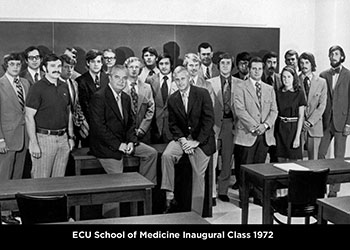
Volume 1, Issue 2, Winter 2013
Happy Holidays
from the ECU Medical & Health Sciences Foundation!
The staff at the ECU Medical & Health Sciences Foundation is very thankful to all who have supported the Brody School of Medicine, the School of Dental Medicine, the College of Nursing, the College of Allied Health Sciences, the Laupus Health Sciences Library and the East Carolina Heart Institute in 2013. Your gifts provide scholarships to deserving students, support faculty and student research, provide funds for needy patients and much, much more.
If you have not made your gift this year or wish to make an additional gift, please do so by visiting www.giving.ecu.edu or by calling one of the following gift officers. You may also consider a gift of stock or individuals who are 70 years or older may make a gift up to $100,000 from an IRA to meet the annual distribution requirement. Via the IRA Rollover, donors are able to support one of the areas within the Division of Health Sciences at ECU without avoiding taxes on the
IRA distribution.
Brody School of Medicine College of Nursing Laupus Library |
School of Dental Medicine College of Allied Health Sciences East Carolina Heart Institute |
Medical & Health Sciences Foundation Site
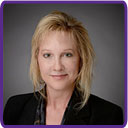 |
Dental School Announces First Research Dean Dr. Sharon M. Gordon has been named the first associate dean for research and chair of Foundational Sciences of the ECU School of Dental Medicine. Gordon assumed her new role August 19. She formerly served as the director of Graduate Research and Training at the University of Maryland School of Dentistry in Baltimore. She was an intramural scientist and directed research training at the National Institute of Dental and Craniofacial Research at the National Institutes of Health. For more than two decades, Gordon has focused on workforce development with special emphasis on research training for clinicians. Her research interest is injury and interaction of the inflammatory response and nervous system in pain and wound healing. She uses an interdisciplinary team approach in research and teaching, as exemplified by her work to create an educational pain management program that uses an inter-professional approach to diagnosing and managing pain. She uses her clinical research and educational experience to teach students about the relationship between patient care and research. “I was trained using the model of general dentistry and comprehensive care that is the basis for ECU’s clinical program, and I am deeply committed to the full development of the general dentist to serve to their full capacity the needs of their patients,” said Gordon. “The ECU School of Dental Medicine is extending this model into the setting of underserved communities, an important step in improving access to oral health care.” Gordon will remain active in her role with NIH and professional organizations, serving on NIDCR’s grants review panel evaluating research training and career development applications and as the national faculty advisor for the National Student Research Group of the American Association of Dental Research. She will also serve as board member of the American Dental Association Student Clinician Awards. Greg Chadwick, dean of ECU’s School of Dental Medicine, said, “Dr. Gordon’s strong research, general dentistry and public health background uniquely qualify her to serve as our first associate dean for research and chair of Foundational Sciences. We are extremely excited to have Dr. Gordon join East Carolina University’s research team and lead the dental school’s research effort on our campus and in communities across North Carolina.” Gordon earned a doctorate in dental surgery from the University of Texas Health Science Center Dental School at San Antonio and completed a two-year general practice residency at Medical Center Hospital in San Antonio. She earned a master of public health in epidemiology in 1997 and a PhD in clinical investigation in 2003 from Johns Hopkins University. If you would like more information on how to support dental research or to make a gift to support the school, please contact Kristen Ward, director of development, at 252-744-2239 or wardk@ecu.edu.
Pictured: Dr. Sharon M. Gordon >> Go To Website
|
|
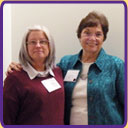 |
The East Carolina University College of Allied Health Sciences celebrated the generosity and commitment of loyal patrons who invest in the future of the college’s students with a homecoming reception and room dedication held Friday, Nov. 8. The lobby was filled with friends and supporters and was the first donor appreciation event of this kind held by the college. Following a time for fellowship and delicious hors d'oeuvres, Dean Stephen Thomas welcomed the esteemed guests and recognized the donors, donor families and current and retired faculty in attendance. Director of Development Patrice Frede took the podium to express her thanks to the college’s patrons and to present two scholarship checks to Dean Thomas which included $2,000 to the Beth Lambeth scholarship in Addiction and Rehabilitation Studies and $1,600 to the Freedom scholarship in Occupational Therapy. Frede also took a moment to thank the staff at the Medical & Health Sciences Foundation who helped execute the event during her deployment in Djibouti, adding that the event signified not only homecoming for ECU but a homecoming for her as well. As a thank you to Dean Thomas for his unwavering support and kindness during her deployments, Frede presented him with an American Flag that was flown over Afghanistan in 2009-10 and Africa in 2011-12 along with a certificate signed by all of the crew. Following the presentations, friends and patrons of endowed funds of $25,000 and above were led by members of the Student Leaders Council to tour the college and view the rooms dedicated in honor of their generosity or in memory of their family member or friend. Each dedicated area in the college memorializes and honors the individual after whom it is named as someone who has given of himself or herself to advance the mission and vision of the college. The following rooms have been named in honor or memory of the college’s faithful friends: Main Lobby/Atrium – Louise O. Burevitch The evening ended with closing remarks from both Dr. Thomas and Frede, thanking each person in attendance for their generous contributions and dedication to the college. Should you wish to give to the College of Allied Health Sciences or any department in the college, or should you have questions, please contact Patrice M. Frede, the College's director of development at (252) 744-3523 or at fredep@ecu.edu.
Pictured (L-R): Dr. Katheleen Schulamn, Dr. Susan Smith >> Go To Website
|
|
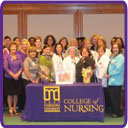 |
College of Nursing Launches Pirate Nurse Network at Vidant Medical Center East Carolina University’s College of Nursing has partnered with Vidant Medical Center to launch its first alumni network in eastern North Carolina. A member-driven support organization, the Pirate Nurse Network will offer educational opportunities, social and professional networking for ECU nursing graduates who work at Vidant in Greenville. Already 140 alumni have joined, and members say they are looking forward to continued growth and activities in the coming months. “The College of Nursing is very proud of its alumni and wants to stay connected with them,” said Dr. Sylvia Brown, dean of nursing. “It is our desire that networks of Pirate nurses can be established throughout our state and beyond as a strategy to support fellow ECU nurses and a way for them to stay in close contact with our college.” Many ECU graduates serve as clinical preceptors for students, and the network is one way to show appreciation for their service to the college, Brown said. Mark Alexander, director of development and major gifts in the College of Nursing, is working closely with liaisons at Vidant to facilitate network events. “Keeping our alumni connected will allow us to do a better job of spreading awareness on all of the great things that we are accomplishing in nursing education as well as raise awareness for areas of need and support,” Alexander said. “When working as a team, there is not a more dedicated group of people than nurses, especially Pirate Nurses.” Two inaugural meetings were held at Vidant in September. New members toured ECU’s state-of-the-art nursing simulation labs on Oct. 17. “Pirate nurses can now access an organized support system within our hospital as they share their Pirate pride and engage in educational, community service and recreational activities with nurse colleagues,” said Jessica Griffin, who serves as network liaison where she is a staff nurse in the special care nursery of the James and Connie Maynard Children's Hospital at Vidant. Griffin also was president of the class of 2001 in the ECU College of Nursing. Initially, interested members were invited to complete a survey on how the network should function and activities that they would be willing to engage in with other alumni. Responses included a desire for monthly educational and professional networking events, opportunities for community service, mentorship and, in the future, scholarships. Nurses who are enrolled wear a “Pirate Nurse” badge reel on their uniforms, officials said. Vidant Medical Center is one of four academic medical centers in the state and serves as the teaching hospital for ECU. The hospital is a tertiary referral center and provides acute, intermediate, rehabilitation and outpatient health services to more than 1.4 million people in 29 counties, according to its website. Any Vidant employee and alumni of the ECU College of Nursing may contact jgriffin@vidanthealth.com or cbunch@vidanthealth.com for more information on Pirate Nurse Network.>> Go To Website
|
|
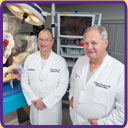 |
Latest Figures Put Robotic Surgery Training Now At 1,370 Individuals One would think it’s not easy to be humble, given all the attention to East Carolina University’s Brody School of Medicine and Vidant Medical Center (formerly Pitt County Memorial Hospital) for the past 13 years. Yet humble is what comes across when speaking with Dr. L. Wiley Nifong about the daVinci minimally-invasive robotic surgery system and the inter-continental training programs that are in place. “Our approach is definitely one nurtured through a team environment. Each member of our staff continually works to make the surgery process as seamless as possible, not only for our surgeons, but the ones we train from all over the world,” Dr. Nifong says. Key training personnel include the efforts of Susan Bewick, the director of the robotic training lab, Rebecca Merrick Gilbird, Dr. Nifong’s executive assistant and the business services coordinator for the Robotic Training Center, and Jerome Fuller, Director of Telecommunications Networks & Special projects at the East Carolina Heart Institute. “We stress the importance of a surgeon-led environment in the operating room, where the surgeon leads the entire surgical team through the surgical procedure. Our daVinci courses train not only the surgeons, but key surgical team members, including anesthesiologists, nurse anesthetists, nurse practitioners, perfusionists, registered nurses, physicians assistants – any medical staff team member that is deemed appropriate for training,” Nifong continues. Dr. Nifong is the director of surgical robotics and the director of surgical research, while also serving as an associate professor of cardiothoracic surgery at the East Carolina Heart Institute. During his tenure, he has been involved with the training of over 700 surgical teams in the use of minimally invasive and robotic surgery, both on-site in Greenville, and at hospitals throughout the world. “In a few days, we will welcome surgical associates from Johns Hopkins in Baltimore and others from Sydney, Australia to train in our robotics center. In fact, our calendar for training is booked for the entire month of December, save for Christmas day,” he said. A portion of the fourth floor of the East Carolina Heart Institute is now dedicated to the Robotic Surgery Center training and education. Although the fourth floor will be utilized during the month of December, the gala opening is planned for February, and a separate article on this will be highlighted in the Spring edition of the newsletter. Dr. Randolph Chitwood, Jr. performed the nation’s first total robotically assisted mitral valve repair surgery in 2000. To date, he has performed over 800 robotic-assisted mitral value repairs. Currently serving as director of the East Carolina Heart Institute, Dr. Chitwood was the chief investigator of the daVinci system for the federal Food and Drug Administration (FDA) clinical trials in robotic surgery. In addition, Dr. Chitwood serves as professor and senior associate vice chancellor for Health Sciences at East Carolina University. “The East Carolina Heart Institute is the only cardiac training center in the world for minimally-invasive robotic surgery using the daVinci system. While the surgery was first developed here for cardiac surgery, our lab has grown to include training for other minimally-invasive surgeries, such as gynecology, urology and general surgery,” Dr. Chitwood states. As early as 1994, Chitwood began finessing his method to improve minimally- invasive cardiac surgery. In 1999 he paired his knowledge with Intuitive Surgical of Sunnyvale, CA to assist in the development of the daVinci Surgical System. In 2000, Chitwood and Nifong used the daVinci to perform the first complete, robotic-assisted mitral value repair in North America, as part of the FDA-approved trial. Later in 2002, the FDA approved the robotic-assisted mitral valve repair procedure. The procedure has now been completed thousands of times throughout the world. Dr. Nifong explains, “More cases are done annually in the United States, with the second most volume being completed in Asia and Europe. To date, we have trained 859 surgeons and 511 Team members for a total of 1,370 individuals. Countries include Australia, Thailand, Taiwan, Canada, Singapore, Brazil, Mexico, Puerto Rico, Italy, Ireland, Japan, South Korea, Belgium and Russia. The process normally begins by the interested party contacting Intuitive, the daVinci manufacturer, or us. We have a substantial online screening process that must be completed before the process can even be started.” “We are now in the fourth generation of the daVinci system. The new system incorporates two consoles with the student at one, and the trainer at the other. This allows both to see a three-dimensional view when operating,” he continues. Dr. Chitwood emphasizes, “Even though we do international training, the primary service was begun, and continues to be, for the people of Eastern North Carolina.” “As our training lab continues to grow with the fourth floor expansion at the Institute, we look forward to training more and more medical professionals throughout the world. The initial training begins with the integration of the team approach. After 25 surgeries are completed, the surgeons then visit East Carolina again for more advanced training. Oftentimes, we travel to the countries involved to assist or do additional focused-training, or proctoring, in their own operating rooms,” Nifong explains. The training is accomplished with both Intuitive-trained physicians and the ECU staff. We offer mini-fellowships, an international summit and other educational opportunities for the robotic training, and for follow-up training with new educational presentation opportunities. “Whether our world-partners travel to us, or we to them, we recognize our responsibility to provide the utmost in training and education to our medical counterparts, in order to advance the minimally-invasive surgical procedures throughout the world,” Nifong says. The Institute is currently looking for a donor for naming rights to the fourth floor training facility. For more information, contact Dr. Chitwood or Dr. Nifong at 252-744-4822.
Pictured L-R: Dr. Nifong and Dr. Chitwood >> Go To Website
|
|
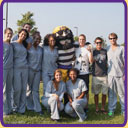 |
Laupus Health Sciences Library Co-Hosts Lake Laupus Health Sciences Campus Student Appreciation Cookout The Laupus Health Sciences Library co-hosted the first annual Health Sciences Campus Student Appreciation Cookout on September 12. The event provided the Health Sciences Campus students with an opportunity to take a break from their studies to socialize and enjoy a “tailgate” style gathering beside Lake Laupus. The bright sun and warm temperatures provided 180 students with the perfect atmosphere for enjoying their dinner between classes or before heading home for the evening. The event, which was free to all ECU students, included great food, music, games of cornhole, and of course…photo opportunities with PeeDee (who enjoyed chasing the Lake Laupus Ducks!) The Laupus Library was honored to co-host this event as a way to say “thank you” to the wonderful Health Sciences students who utilize the Library on a daily basis. Laupus Library is located in the Health Sciences Building on ECU’s medical campus. The library shares this 300,000 square foot state-of-the-art educational center with the College of Allied Health Sciences and the College of Nursing. The four-story 72,000 square foot library provides study space, a computer lab, media production and consultation services, reference services, circulating and historical collections. Support from donors and friends is sincerely appreciated. Several funding priorities within the Laupus Library include: endowments to support collections and materials (electronic and hard copy); faculty/staff professional development; sponsorship support for the annual Laupus Library Health Sciences Author Recognition Awards Event; support of the History Collections, Archives, and the Country Doctor Museum; including the Library in one’s estate for planned gifts; plus a wide variety of unique naming opportunities located throughout the library. Alumni and friends are always welcome to visit the Laupus Library or the Country Doctor Museum in Bailey! Stop by for a visit or contact Dwain Teague at teagued@ecu.edu or (252) 744-0248 to schedule a tour. >> Go To Website
|
|
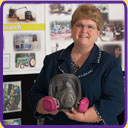 |
Farming, Fishing, Forestry - We Are Your Resource In only a few short minutes with Robin Tutor-Marcom, you quickly realize her post as the Director of the North Carolina Agromedicine Institute (‘the Institute’) is far more than just a career – it is her life's mission. “Here at the Institute, we’re focused on the people who feed and clothe us,” Tutor-Marcom says. “In Farming, Fishing and Forestry, or the three “Fs” as we call them, the rate of injury and fatalities are higher than in any other profession in North Carolina. It is our responsibility with the Institute to shed light on the newest medical research and health education to these groups. We are a hub of information.” Tutor-Marcom also serves as Project Manager of the AgriSafe Network for North Carolina and is an Adjunct Professor of Public Health in ECU’s Brody School of Medicine. But perhaps one of her greatest responsibilities is assisting her family in their farming operation in Johnston County. “I was born and reared on a family farm, so I know what is at stake for rural communities.” Sanctioned in 1999 by the Board of Governors from the UNC General Administrations, the Institute is a University of North Carolina inter-institutional program that combines the efforts of ECU, North Carolina State University and North Carolina A&T. “In the 80s, the Medical University of South Carolina began such a concept, by partnering with South Carolina Cooperative Extension. We started with this as model, and it was spearheaded by Dr. Paul James, a local physician, and Billy Caldwell, a Cooperative Extension Specialist at NCSU. A number of community partners have worked with Agromedicine through the years,” Tutor-Marcom said. The top industry in NC is agriculture and agribusiness, providing more than $77 billion in revenue, with $14.9 billion derived directly from farm production. Located in the former Voice of America building on East Carolina’s West Research Campus, the Institute was initially launched by organizers who realized the high percentage of farm injuries and fatalities was significant. Through the years, the emphasis has broadened to include forestry and fishing, as all have health and safety concerns. The three vocations combined bring the average fatality rate to 7.5 times higher than the average career in NC. The NC Agromedicine Institute has a three-prong mission:
“We have a vast network of partners to assist us in our mission, including health professionals, educators, Cooperative Extension personnel, health and safety experts and students. All bring their own unique area of expertise to our research and applied programs,” she said. One of the programs Tutor-Marcom is most proud of is AgriSafe Network of North Carolina. This is an educational program for farmers, farm families and farm workers. “Services are provided on your farm and are free except for personal protective equipment. We perform medical screenings such as blood pressure, blood sugar, and hearing, lung function testing, even mobile mammography. Our nurse provides information on how to prevent heat stress, skin cancer, eye injuries, toxic pesticide exposure, and child injuries on the farm,” Marcom-Tutor says. “Over 30% of participants at events we do, presents with a health issue. That is why it is so important for us to provide this much needed service to the medical community,” she continues. “We realize that all professions work different hours. We meet our clients when they need us. Whether it is on the combine in the cornfield, on the boat when the shrimp trawler heads out, on the logging deck at daybreak, or the medical office for provider and client education, we will accommodate your schedule. Whenever we’re needed, we will be there,” Tutor-Marcom says. In the field, literally, or in the classroom, The Institute provides the type of education needed to better prepare agricultural workers and their families, on a day-to-day basis. In addition, the Institute can educate or counsel medical professionals on specific agricultural-related illnesses, such as respiratory or toxicological, which might be treated initially as more mainstream in the emergency room or doctor’s office. With up-to-date seminars and classes, physicians are taught to recognize specific presenting symptoms through the patient’s vocation. An upcoming seminar will be taught through ECU’s Office of Continuing Studies, “Agricultural Medicine: Occupational & Environmental Health for Rural Health Professionals”, with the first session, of three, being taught in Greenville on January 30 – 31, 2014. For more information or to register, call the Office of Continuing Studies at 252-328-9198 or visit www.cpe.ecu.edu. In addition, three new updated online continuing education courses will be taught regarding Pesticide Related Illness & Health Issues, with emphasis on pesticide exposure and diagnosis of illness and long-term effects and clinic preparation. To register for these continuing education courses, visit www.AHEConnect.com. For more information on the NC Agromedicine Institute, contact Robin Tutor-Marcom at 252-744-1008. The Institute is always looking for partners to assist in the endeavor, including students, whose research projects may fit nicely within the realm of agricultural occupational health and safety.
Pictured: Robin Tutor-Marcom
|
|

